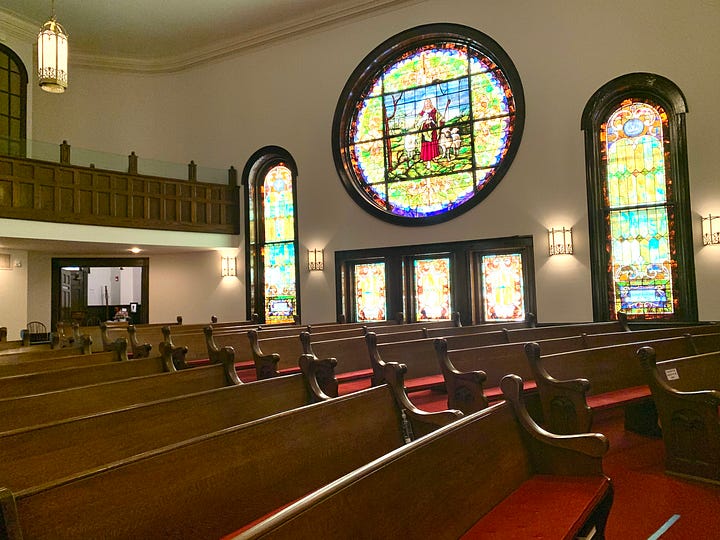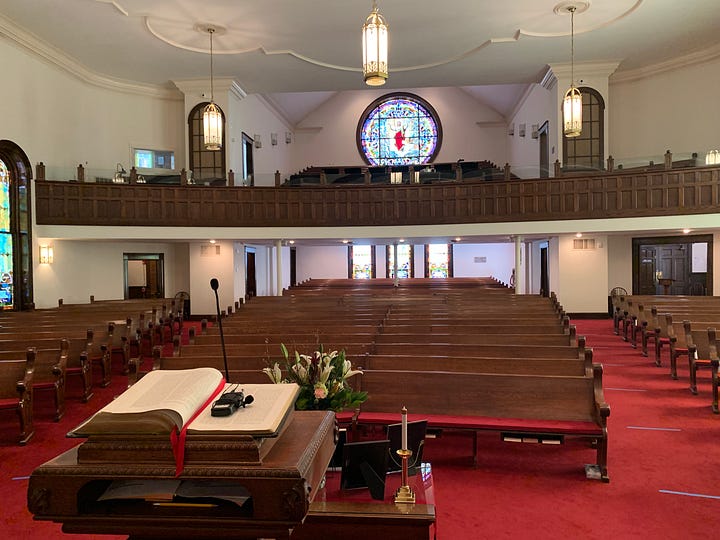The Gethsemane Window
On a sunny afternoon in early April 2022, I stood alone in the church sanctuary in North Carolina where I spent countless Sundays over the first 18 years of my life. My mother’s memorial gathering was starting soon, and I was happy to have a few minutes alone in this beautiful place where my family had spent so much time.
My father’s and grandmother’s funerals took place here when I was a little girl, and many years later, I got married here. It’s a lovely space with pews set in a semi-circle, giving it an intimacy I like. But there was something specific I’d wanted to see again before anyone else arrived – the trio of huge round stained-glass windows.
At the back of the church in the balcony — appropriately? — is a window depicting Jesus ascending to heaven. The window on the right side of the sanctuary could have been titled “Jesus the Good Shepherd,” as it shows a gentle scene with Jesus carrying lambs.


But it is the third window showing Jesus in the Garden of Gethsemane that has stayed with me for decades. It captures the famous quiet moment of despair – Jesus kneeling and looking up to the skies as two of his disciples huddle almost unnoticed in the background of the stained-glass scene. Even as a child sitting in the sanctuary and looking at the windows as I fidgeted through Sunday services, I was drawn to that window – no doubt because I already understood deep sadness, and that depiction was comforting to me in a way I probably didn’t understand at the time.
My relationship with religion has evolved quite a bit since the years I spent in this place. To use a category I once saw on a dating website, I am “more spiritual than religious.”
But during two of the hardest experiences of my life – being there for the last year of my sister’s life and for the last weeks of my mother’s life – I thought of that Garden of Gethsemane window and the anguished, simple, futile request I knew all too well from my years of Sunday School and Easter services. I can no longer quote the passage word for word, but I believe Jesus’ words were along the lines of “Let this cup pass from me.”
And that is what I wished for at my lowest points as I watched the ends of my sister’s and my mother’s lives play out. I wanted to run away from home. I wanted someone else to step up and take charge. I wanted someone else to make sure everything would be as alright as it could possibly be for my sister and later for my mother.
Those low points were tough to take; you don’t want to be the person who wants to flee the hard times. You want to be the steady, cheerful one. Many years before, a romantic partner had referred to me as “the rock,” and I remember thinking that this was somehow the role I was supposed to play. I also thought – but never said out loud – that it would have been nice to take turns.
When I was struggling, that Gethsemane window reminded me that one of the best-known stories in the world included this very real, not-heroic moment of truth. While I knew logically that it was human to feel the way I was feeling, my memory going back and retrieving that image from my childhood helped bring that message home when I needed it most.
After my mother’s memorial, friends who had driven down for the service from the town where I live now commented on how beautiful the sanctuary was. I told them how much I had always loved the windows, and I pointed to the Gethsemane window and shared a much-abbreviated version of what I’ve written above.
That night, one of those friends sent me this message (edited a little).
Your words about that stained glass in the church have stuck with me. I wonder about the artists who worked on that commission. What did they think about it? Did they get bored of the church work? Or did they know somehow, that someday, a window they installed decades ago would provide some comfort to a woman as she tends to her mother on her way out of this world? And I think that if you are the only person that piece ever spoke to, that's enough. More than enough. Because in its own way, it's really a supernatural thing for some pretty glass to do.
It is.
I looked up the word supernatural, and an Oxford dictionary definition describes it as something “attributed to some force beyond scientific understanding or the laws of nature.”
And being there for each other, in any way we can manage on any given day, even when what we really want to do is run away (Let this cup pass …) is, it seems to me, a supernatural thing for a human to do. We just need to give ourselves some grace and allow ourselves to believe it.






